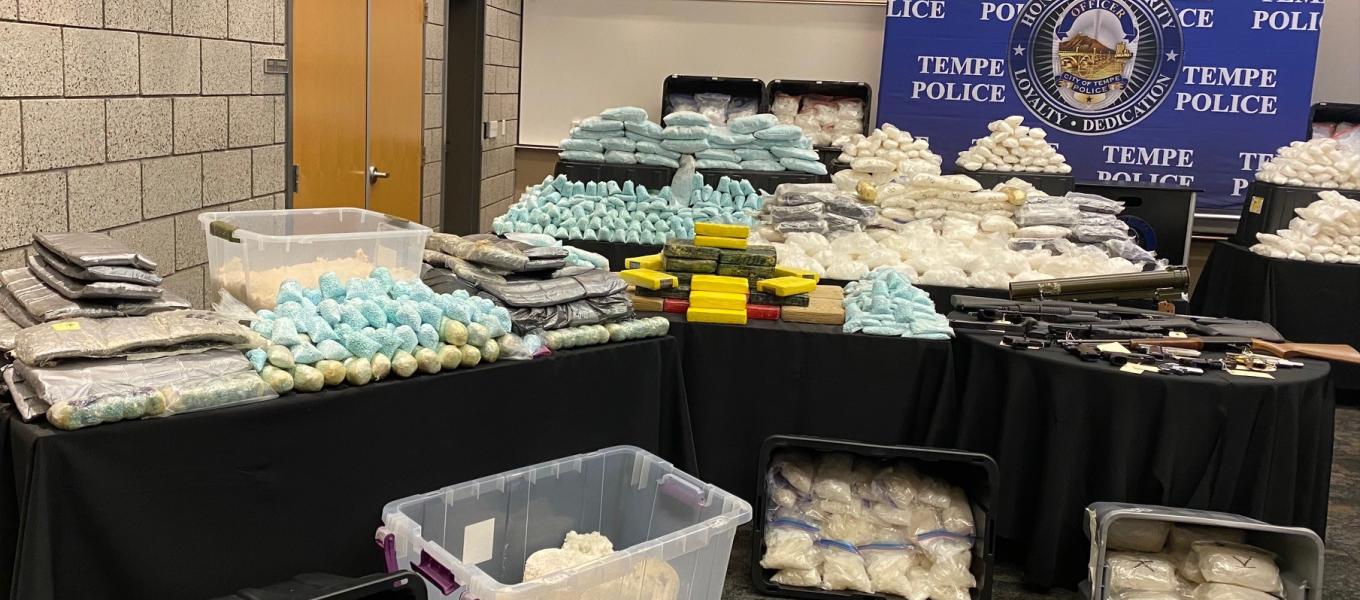The Arizona Legislature is considering a bill that would declare fentanyl crossing the state’s southern border a public health crisis and require the state’s Department of Health Services (ADHS) to do whatever is in his power to stop the problem. House Bill 2469 passed in the House by a narrow 31-28 vote in March, and is currently awaiting further action in the Senate.
Under HB 2469, the Legislature would declare public policy in Arizona to include protecting the state from drug cartels that threaten the public safety, health, and general welfare of the population. It would also state that overdose deaths involving synthetic opioids are primarily due to illegally manufactured fentanyl.
“What this bill is trying to do is ensure that Arizona is committed to using its sovereign authority whenever possible at the border,” said Steve Montenegro (R – Maricopa), sponsor Bill. “Arizona is effectively ground zero for fentanyl and the trafficking across our border of this deadly weapon.”
ADHS data on opioids shows that more than five people die every day from an opioid overdose in the state. In 2017, a statewide public health emergency was issued in an effort to reduce opioid overdose deaths, but the problem has worsened across the country.
As of April 4, Arizona has had 827 verified nonfatal opioid overdoses, 93 confirmed opioid-related deaths, and 1,806 emergency or hospital visits involving a suspected opioid overdose. ADHS data also shows that 78% of EMS and law enforcement responses to suspected overdoses involved the administration of naloxone to reverse the overdose.
Montenegro highlighted opioid-related death and overdose rates, while linking them to illicitly manufactured fentanyl distributed in illegal markets. Under the bill, state laws should be implemented to protect Arizona’s sovereign power from unlawful invasions at the Arizona-Mexico border, while defining unlawful invasions to include fentanyl trafficking.
“I sincerely believe that this (draft law) will enable us as a state to use the tools we need to continue working together to exercise our sovereignty,” Montenegro said.
The Washington Office for Latin America (WOLA) is a research and advocacy organization that focuses on human rights in the Americas. Under a WOLA Update as of March 24, the organization said cross-border trafficking of fentanyl was moving from California to Arizona. WOLA highlighted the visit of ADHS Secretary Alejandro Mayorkas to the Mariposa Port of Entry located in Nogales on March 21st. Mayorkas celebrated the launch of an operation known as Operation Blue Lotus, which targets cross-border trafficking of fentanyl.
The Nogales Border Crossing recently had a Multi-Energy Gate Scanner installed, which is a non-intrusive inspection technology, and is one of two that ADHS plans to install in this area. According to WOLA, Mayorkas explained how, from March 13-19, the devices led to 18 narcotics seizures, including over 900 pounds of fentanyl, over 700 pounds of methamphetamines and over 100 pounds of cocaine.
A three-year investigation targeting the Sinaloa drug cartel has led to a massive seizure and numerous arrests last February. To date, the operation has arrested over 150 accused persons and seized over 4.5 million counterfeit prescription pills containing fentanyl, 66 kilograms of fentanyl powder, 138 kilograms of cocaine, 3,100 pounds of methamphetamine, 35 kilograms of heroin, 49 guns and more. $2 million.
“The seized fentanyl represents more than 30 million potentially lethal doses,” said a statement from the Drug Enforcement Agency (DEA). “This investigation is part of the DEA’s work to defeat the criminal Sinaloa and Jalisco drug cartels that continue to drive drug addiction and poisonings in communities nationwide, threatening the safety and health of Americans. . The Sinaloa Cartel is responsible for almost all of the flow of deadly narcotics into Arizona.
The DEA said criminal cartels are mass-producing fake pills that look like prescription drugs — like Oxycontin, Hydrocodone, Percocet, Xanax and Adderall — that actually contain fentanyl. The agency also noted that criminal cartels hide fentanyl in other drugs such as cocaine, methamphetamines and heroin, and that any illicit fentanyl is dangerous and can be deadly.
While all committee members agreed that cross-border trafficking of fentanyl is a major problem that needs to be addressed, Sen. Eva Burch (D-Maricopa) raised concerns about what the legislation would specifically require of ADHS.
“I have significant concerns about the vagueness of this language directing one of our departments to do whatever it takes without any definition of what that means or direction on how to accomplish this request,” Burch said.
State of Reform has contacted Arizona Public Health Association (AZPHA) executive director Will Humble for more information, who said ADHS authority is limited to current regulations for healthcare facilities. approved. He thinks the bill’s requirements might be more appropriate for another state agency.
Humble said this bill may require ADHS to review and update its licensing regulations to be stricter on prescribing opioids, which would be an indirect intervention because it does not would only cover prescription opioids rather than illegal fentanyl.
“AHCCCS (Arizona Health Care Cost Containment System) arguably has more ability to influence the epidemic by increasing its network of opioid treatment options and capabilities,” Humble told State of Reform. “This bill would make more sense if it were to challenge the Arizona National Guard or Arizona Homeland Security with these nebulous guidelines.”

